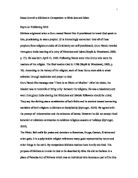British Colonialism made a significant impact upon the asian sub continent. Traditions such a sati were made illegal straight away which restricted some of their religious values, especially in upper class Brahmin villages. The British administration required a central government. This meant that there was a higher level of communication present such as telephones and transport, which had a profound effect on the social and cultural development of the country as a whole. The rise of such mass communication meant that ideas, beliefs and values spread quicker from different regions. Especially western ideas in this case. Western Science and philosophy began to establish itself. Schools of thought from philosophers such as Mill and other Utilitarianists who promoted ideas stemming from rationalism and logic. For the Liberal minded a western education was the key to improving the lot of the average Hindu. Whereas for evangelical Christian the conversion to Christianity would offer India a new hope. These changes to the institutional, stuctrual and cultural fabric of society made life for the ordinary Hindu considerably more complex and thus many reform movements began to start in the hope of not only preserving Hinduism but finding the original truth which some felt had been lost.
How did it reform?
Different cultures and societies react in different ways to new influences and external pressures. I will mention some key reformers who either rejected, absorbed or experimented with the some of these influences according to their own personal religious and social beliefs
Ram Mohan Roy was born of a distinguished Brahmin family in Bengal. Essentially a humanist and religious reformer; he left his job to devote his time to the service of his people. Profoundly influenced by European liberalism, Ram Mohan came to the conclusion that radical reform was necessary in the religion of Hinduism and in the social practices of the Hindus. He founded the Brahmo Samaj at Calcutta in 1828, which was initially known as the "Brahmo Sabha." In 1814 he formed the Atmiya Sabha and carried on a persistent struggle against the religious social problems, which were widely prevalent among the Hindus in Bengal. He therefore, opposed the worship of idols, the rigidity of caste, and the prevalence of meaningless religious rituals and condemned the priestly class for encouraging these practices. His services to the cause of the abolition of suttee are well-known. By citing the authority of Upanishads he showed that the Hindu religion at its best was opposed to the practice but more than that he appealed to the reason and humanity and compassion of the people. He visited the burning ghats at Calcutta to try to persuade the relatives of widows to give up their plan of self-immolation. He organised groups of like-minded people to keep a strict check on such performances and to prevent any attempt to force the widows to become sati. Finally, Sati was abolished by the government in 1829. He was the first feminist in India and his book, Brief remarks regarding modern encroachments on the ancient rights of females (1822), is a reasoned argument in favour of the equality of women. He condemned the subjugation of women and opposed the prevailing idea that women were inferior to men in intellect or in a moral sense. He attacked polygamy and the degraded state to which widows were often reduced. To raise the status of women he demanded that they be given the right of inheritance and property.
In addition He argued for the reform of Hindu law, led the protest against restrictions on the press, mobilised the Government against the oppressive land laws, argued the case for the association of Indians in Government and argued in favour of an English system of education in India. Therefore Ram Mohan Roy absorbed many of the key characteristics of the western world.
Another key reformer was Ramakrishna who was a Bengali saint. He had devoted his life to serving Goddess Kali in the mandir. His reaction to the western influence represents the most typical response so far.
Ramakrishna’s main ideas was to promote the universal religion. He apparently had visions of many religious figures from Christian and Muslim traditions. For him, there was no one truth.” God in the form of the saint, God in the form of the sinner, God in the form of the righteous, God in the form of the unrighteous. Every religion is correct as religion aims to encapture the truth and union with God. Therefore it is the desire for God that is needed rather how you practise it.”
Another important reform movement was the Arya Samaj, founded by Swami Dayanand Saraswati. He protested his voice against two main evils. Firstly, Idolatry, rituals and priesthood and the false teachings of Puranas. And secondly against the caste system and its deiscrimination against untouchability
According to Ramakrishna, to know God as the only Reality and the world as an unreality is jnana (knowledge). But he exhorts to go beyond that highest realization to have "vijnana". He teaches us, "What is vijnana? It is knowing God in a special way. The awareness and conviction that fire exists in wood is jnana, knowledge. But to cook rice on that fire, eat the rice, and get nourishment from it is vijnana. To know by one’s inner experience that God exists is jnana. But to talk to Him, to enjoy Him as Child, as Friend, as Master, as Beloved, is Vijnana. The realization that God alone has become the Universe and all living beings is vijnana"
Vivekenanada was another interesting refomer since he did not believe in God with forms nor in images and temples. He never had faith in any particular scripture but promoted Shankara. He did not accept Prophets or Incarnations. With his intellectual approach, he challenged many of the known leaders of religions of his time. It was Swami Vivekananda, who introduced Vedanta to the West. He was the most applauded religious leader of the Parliament of Religions held at Chicago in 1893. He established Ramakrishna Mission to spread the message of his Master. “Do this either by work, or worship or psychic control, or philosophy- by one, or more, or all of these- and be free”.” This is the whole of religion. Doctrines, or dogmas, or rituals, or books, or temples, or forms, are but secondary details". Therefore Vivekenamda rejected many of his own traditions but did not absorb any of the external influences either such as Islamic and Christian traditions.







